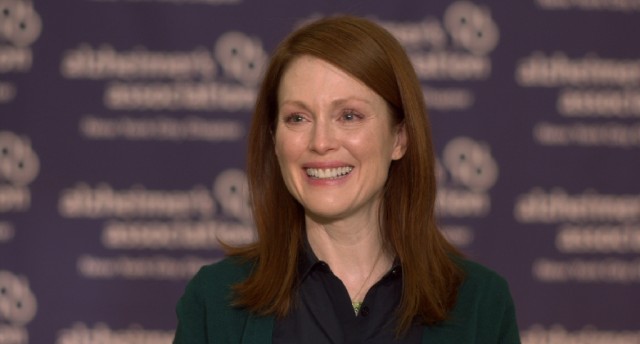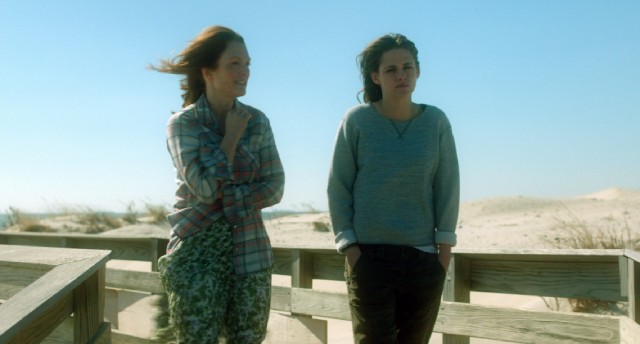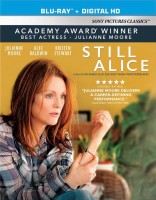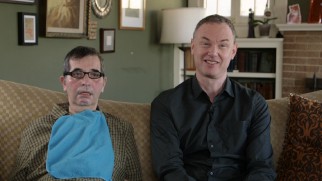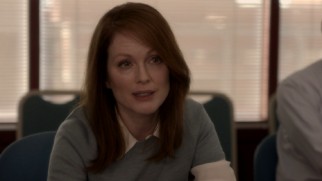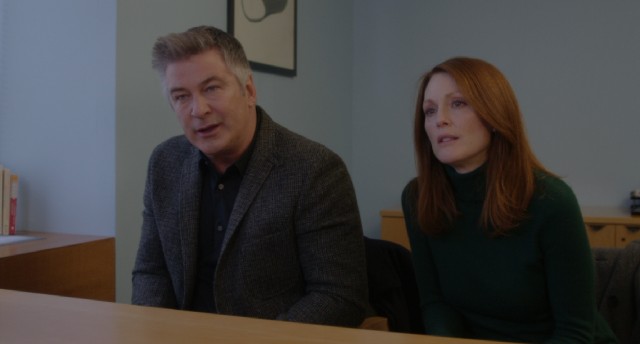Still Alice: Blu-ray + Digital HD Review
 |
Still Alice
Theatrical Release: December 5, 2014 / Running Time: 101 Minutes / Rating: PG-13 Directors: Richard Glatzer, Wash Westmoreland / Writers: Lisa Genova (book); Richard Glatzer, Wash Westmoreland (screenplay) Cast: Julianne Moore (Alice Howland), Alec Baldwin (John Howland), Kristen Stewart (Lydia Howland), Kate Bosworth (Anna Howland-Jones), Hunter Parrish (Tom Howland), Daniel Gerroll (Eric Wellman), Stephen Kunken (Dr. Benjamin), Shane McRae (Charlie Howland-Jones) |
Buy Still Alice from Amazon.com: Blu-ray + Digital HD • DVD • Instant Video
For Julianne Moore, the Oscar question always seemed to be not "if" but "when." The redheaded actress had been too good in too many movies for too long for a statuette and a speech to be anything but inevitabilities. The well-deserved accolade seemed more about Moore than about the movie for which she entered the winner's circle. Still Alice hadn't even opened when Moore's Academy Award nomination was announced, simply the last big stop on her award season of domination. It slowly expanded in limited release, finally crossing the 1,000-theater threshold the weekend after Moore's victory became official to nobody's surprise.
By most accounts, it seemed like Moore was the movie, since Still Alice received little recognition beyond the lead performance. Adapted and directed by Richard Glatzer and Wash Westmoreland, a gay married couple who had risen the ranks from writing-producing trashy TV and directing gay porn, respectively, Still Alice tells the story of Alice Howland (Moore), a respected Columbia University linguistics professor who is diagnosed with early onset Alzheimer's disease shortly after turning 50.
Alice is shocked and dubious about the diagnosis, but memory tests and brain scans confirm it. She is heartbroken to discover that hers is the familial variety, which means her three children have a 50% chance of inheriting the same condition in middle age. The children -- catty mom-to-be Anna (Kate Bosworth), struggling actress Lydia (Kristen Stewart), and son Tom (Hunter Parrish) -- wrestle with getting tested. Alice's husband John (Alec Baldwin) tries to be as supportive as he can be.
Family support is not enough to cushion Alice from the blows of her senility-inducing neurogenerative disease. She soon loses her position at Columbia and as her condition worsens, she struggles to recognize her own children while unavoidably becoming a bit of a burden on her loved ones.
Adapted from the 2007 novel of the same name by American neuroscientist Lisa Genova, Still Alice does not have to do much. It raises its dilemma early on and simply sees it through as its protagonist's disease advances. The movie avoids going too big in its depictions. Alice's plight is one that really only affects her and, to a lesser degree, her immediate family. All try to cope with the bad hand dealt the best they can, but tensions still form in this appealing and intimate character study.
The three most reliable paths to Oscar glory are physical transformation, portraying a well-known figure, and dramatizing a disease. The Best Actress category has been upholding these tenets thoroughly. Of the last four winners, Meryl Streep impersonated Margaret Thatcher, while Natalie Portman, Cate Blanchett, and Jennifer Lawrence all wrestled with descents into madness or at least flirtations with mental instability. It's easy to say Moore went the disease route and liken her to Dustin Hoffman's take on autism (Rain Man) and Day-Lewis' cerebral palsy performance (My Left Foot). Does that trivialize Moore's achievement? Perhaps. But it's also a fair observation. Throughout her career, Moore had faced and surmounted more subtle acting challenges for a wide variety of directors. It's not as if referring to Still Alice as "that Alzheimer's movie" marginalizes what the movie and its leading lady do, which is to put an empathetic human face on a rare but real and heartbreaking condition.
Still Alice depicts the condition tastefully and honestly, with Moore making it easy to appreciate just how frustrating it would be to lose control of your mind, the tool that drives virtually every aspect of life, especially for an academic. The subplots that present themselves -- John wanting to take a job at the Mayo Clinic, Lydia resisting her mother's wish for her to attend college -- offer passable complement to the disease narrative that demands little support. You're left thinking about what you would do in Alice's position or in the position of her loved ones. It's something to think about and to be grateful if this disease is not currently taking its toll on you or your family.
Doing solid business in limited release, Still Alice peaked with its post-Oscar weekend expansion. It finished with a domestic gross of $18.6 million, generating a healthy profit on the very reasonable $5 million budget and actually outperforming a couple of more extensive Oscar contenders from the same distributor, Sony Pictures Classics (Whiplash and Foxcatcher).
Sony recently brought Still Alice to DVD and Blu-ray, each equipped with a digital copy.
VIDEO and AUDIO Still Alice may not have garnered much love for its technical achievements, but the movie looks absolutely terrific in Sony's sharp, immaculate 1.85:1 presentation. The warm, vibrant visuals are complemented by a tasteful 5.1 DTS-HD master audio soundtrack.
BONUS FEATURES, MENUS, PACKAGING and DESIGN The all-HD extras begin with "Directing Alice" (8:40), the first of three features exclusive to the Blu-ray. This one discusses the directing couple's experience, "Finding Alice" (9:20) discusses the disease and how the film sought to depict it accurately. Experts, victims-advisors, and the cast and filmmakers weigh in. Another exclusive, the curiously blurry "Interview with Composer Ilan Eshkeri" (6:29), gathers behind-the-scenes footage and remarks from Eshkeri about his Still Alice score. Three deleted scenes (6:08), also left off the DVD, show us more of Alice at her sharpest, more of John injecting himself into Alice's prescribed medical treatment, and Alice exhibiting senility at a student's presentation. Being a Sony Pictures Classics release, Still Alice kindly has its theatrical trailer (2:18) preserved here. "Previews" repeats the disc-opening trailers for Whiplash, Foxcatcher, Mr. Turner, Leviathan, Red Army, and Wild Tales. The scored, static menu adapts the poster and cover art. Sony authors the Blu-ray to support bookmarks and to resume playback. An insert bearing your Digital HD UltraViolet code accompanies the full-color disc in a side-snapped keepcase that is topped by a glossy slipcover featuring the same artwork.
CLOSING THOUGHTS Still Alice is worth seeing for Julianne Moore's Oscar-winning performance alone, but there is more to this thought-provoking Alzheimer's drama than that. Treating the film to top-notch picture and sound plus a good handful of extras, Sony's Blu-ray warrants a look. Buy Still Alice from Amazon.com: Blu-ray + Digital HD / DVD / Instant Video
|
Related Reviews:
DVDizzy.com | DVD and Blu-ray Reviews | New and Upcoming DVD & Blu-ray Schedule | Upcoming Cover Art | Search This Site
DVDizzy.com Top Stories:
Julianne Moore:
The Kids Are All Right • Chloe • What Maisie Knew • The English Teacher • Crazy, Stupid, Love. • A Single Man • Vanya on 42nd Street • Blindness
Best Actress Oscar Winners: Blue Jasmine • Silver Linings Playbook • The Iron Lady • Black Swan
Amour • The Diving Bell and the Butterfly • Cries & Whispers • Dallas Buyers Club • Rust & Bone • Soul Surfer
Kristen Stewart: Welcome to the Rileys • Adventureland • The Runaways | Kate Bosworth: And While We Were Here • Big Sur
New: Big Eyes • American Sniper • Mr. Turner • St. Vincent • Lovesick • The Cobbler
Text copyright 2015 DVDizzy.com. Images copyright 2014 Sony Pictures Classics, BSM Studio, Killer Films, Big Indie Pictures, Shriver Films, and 2015 Sony Pictures Home Entertainment.
Unauthorized reproduction prohibited.
